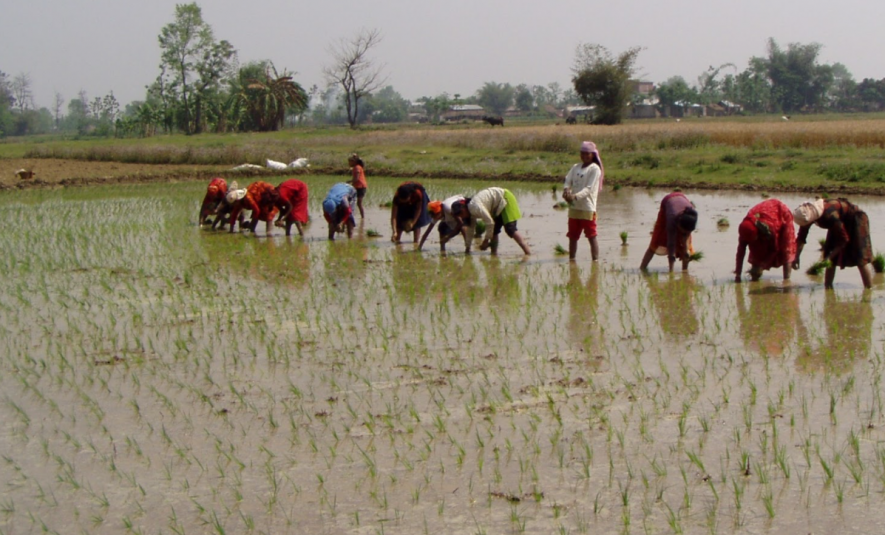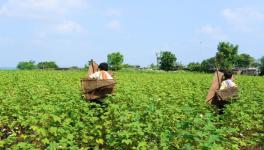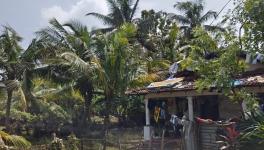Bihar: Paddy Farmers in Flood-Prone Areas Face Water Crisis

Representational use only.
Patna: Lakhan Rai, a marginal farmer, is restless over dry paddy fields that have developed huge cracks. There is a serious water crisis in his village as different water bodies dried, private handpumps have also dried up, and there is no rain during the ongoing month of Sawan, traditionally- heavy rains during monsoon.
"This is really an unusual situation here. Poor monsoon has affected us. Paddy cultivation is facing a difficult time. It is the first time that handpumps dried up in our village, indicating the depletion of the groundwater level. There is no water available in the canal, and ponds have also dried," Rai, a resident of Kalyanpur village under Aurai block in Muzaffarpur district of Bihar, told NewsClick.
Rai is not alone. Thousands of farmers in hundreds of villages in flood-prone half a dozen blocks, including Aurai, Katra, Muraul, Sakra, Bandra and Manipur, are facing the brunt of climate change. "Usually, in the last week of July, we used to face floods and never expected such a water crisis. In place of plenty of water during annual floods, we are facing a drought-like situation," said Sambhu Yadav, a small farmer, resident of Bishnupur village under Katra block.
Rai and Yadav said villagers are going through the problem of lack of drinking water after handpumps dried up and appealed to farmers not to pump groundwater by diesel pump for irrigating paddy fields.
They pointed out that paddy-growing farmers are fully dependent on heavy rainfall during June and July, followed by wet August. But this year's repeated dry spell in the last 50 days is alarming. In other flood-prone districts like Sitamarhi, Supaul and Bhagalpur, farmers have also been facing the water problem for paddy cultivation due to poor monsoon.
Similarly, farmers in drought-prone Gaya and Aurangabad districts are upset and losing hope to grow paddy this year due to the lack of water. "We are yet to start paddy seedlings transplantation. Our farmlands are dry and have developed cracks. A small number of farmers who transplanted paddy seedlings are struggling to save. Paddy is either drying or turning yellow due to lack of rains,” Mukesh Kumar, a marginal farmer of Dumri village under Fatehpur block in Gaya, said.
Another farmer Bhola Singh of Tekari block in Gaya said paddy cultivation is badly affected due to a lack of irrigation.
Devendra Mandal, an agriculture scientist at Krishi Vigyan Kendra, Gaya, said the condition is not good for paddy-growing farmers this year. "So far, less than 5 % of paddy seedling transplantation has been completed in Gaya, and there is not much hope if heavy rains do not happen by the end of July. Paddy seedling transplantation in early August is bound to affect its yield and production,” Mandal said.
More or less, the same situation was reported in other drought-prone districts of Jahanabad, Aurangabad, Arwal, and Nawada. Bihar recorded 45% less than the normal rainfall from June 1 to July 25, per the rainfall report of the Indian Meteorological Department (IMD) Centre, Patna.
An official at IMD Centre, Patna, told NewsClick that as per official data, the state recorded 242.2 mm of rainfall against the normal 442.2 mm rainfall, which is 200 mm less.
According to agriculture department officials, of 38 districts, only three districts have received normal rainfall this time. About 35 districts have received less than normal rain. "Overall situation of rains is serious, 26 districts have received 59% less than normal rains and nearly a dozen districts received more than 70% less than normal,” the official said.
Officials of the IMD here have ruled out rains till July 28-29. This is bad news for rice-growing farmers fighting to keep paddy saplings alive in their small nurseries. The IMD Patna clarified that there is little chance or possibility of rain in the next few days.
Agriculture scientist SK Singh said that June-end to July 10-15 is the best time for paddy transplantation, but farmers face a big problem due to poor monsoon.
Abdus Sattar, a senior scientist at the Centre for Advanced Studies on Climate Change, Rajendra Prasad Central Agricultural University, Pusa in Samastipur district, said Bihar is witnessing a change in the rainfall pattern due to climate change.
Sattar told NewsClick that rainy days during monsoon are decreasing year after year in the last two to three decades."The government and the farmers have to adapt new crops to face the reality of climate change. This is a must for survival and sustainable development," he said.
He said farmers would have to change the cropping pattern as the climate would become erratic.
Get the latest reports & analysis with people's perspective on Protests, movements & deep analytical videos, discussions of the current affairs in your Telegram app. Subscribe to NewsClick's Telegram channel & get Real-Time updates on stories, as they get published on our website.
























